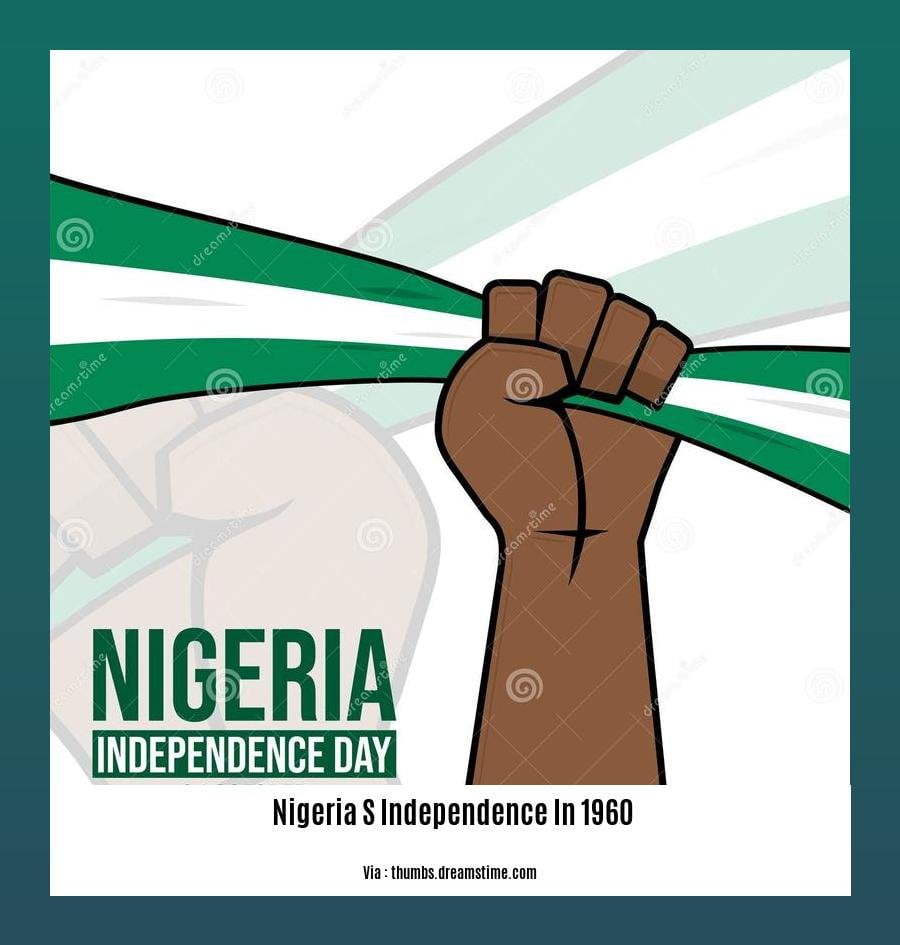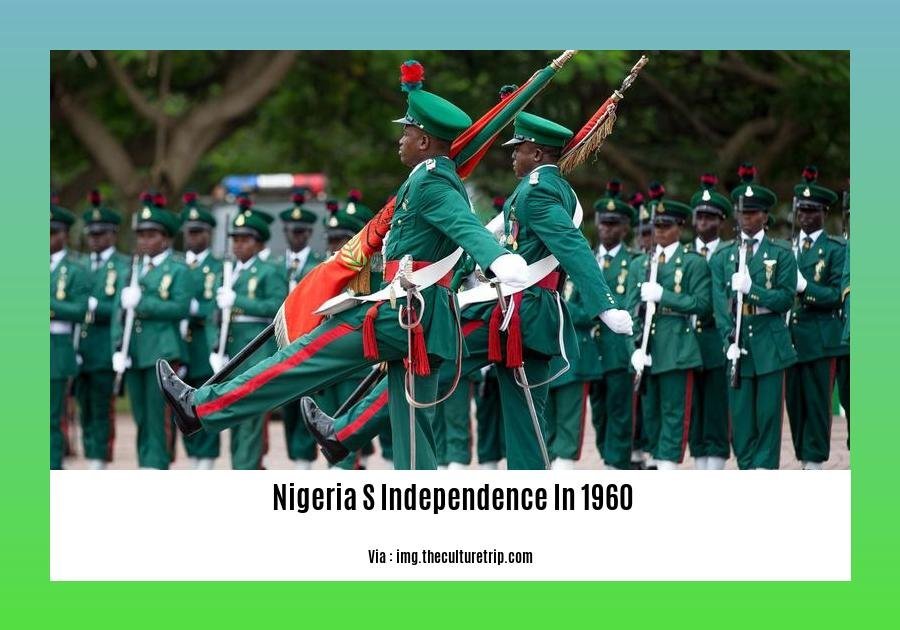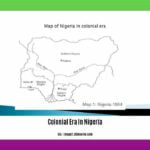Nigeria’s Momentous Independence in 1960 marked a watershed moment in African history, ushering in an era of self-governance and sovereignty for the nation. The decades-long struggle for independence from British colonial rule culminated in this momentous event, shaping the destiny of Nigeria and inspiring countless other African nations on their path to liberation.
Key Takeaways:
- Nigeria gained independence from Britain on October 1, 1960.
- Independence was achieved due to the decline of the British Empire and the rise of African nationalism.
- Nigeria adopted a federal system of government and a parliamentary system of democracy.
- Abubakar Tafawa Balewa became the first elected prime minister.
- Nigeria became a republic in 1963.
Nigeria’s Independence in 1960

After years of struggle and resistance, Nigeria finally gained independence from British colonial rule on October 1, 1960. This historic event marked a pivotal moment in the country’s history.
Factors Leading to Independence
- The decline of the British Empire and the rise of African nationalism
- The efforts of Nigerian nationalists, such as Herbert Macaulay, Nnamdi Azikiwe, and Obafemi Awolowo
- The growth of a strong and united political movement
- The international pressure for decolonization
Post-Independence Era
After gaining independence, Nigeria adopted a federal system of government and a parliamentary system of democracy. Abubakar Tafawa Balewa became the first elected prime minister. The country faced numerous challenges in its early years, including:
- Political instability
- Ethnic and religious tensions
- Economic challenges
In 1963, Nigeria became a republic and adopted a new constitution. However, the country continued to struggle with internal conflicts and military coups.
Legacy of Independence
Nigeria’s independence in 1960 was a significant milestone in the country’s history. It marked the beginning of a new era of nationhood and self-governance. Despite the challenges it has faced, Nigeria remains one of the most influential countries in Africa and a symbol of the continent’s progress.
Unravel the rich tapestry of Nigeria’s past by exploring our comprehensive guide on the History of Nigeria.
Delve into the fascinating era of British rule that shaped the nation’s destiny in our detailed article on the Colonial era in Nigeria.
Discover Nigeria’s vibrant cultural landscape, showcasing the rich diversity of its people and traditions, in our informative exploration of Ethnic and cultural diversity.
Role of key figures in the independence movement
The independence movement in Nigeria was spearheaded by several prominent figures who played pivotal roles in the struggle for self-determination. These individuals, with their unique backgrounds and contributions, shaped the course of Nigeria’s path to nationhood.
Dr. Nnamdi Azikiwe: A renowned nationalist, Azikiwe was a leading advocate for Nigerian independence. He founded the National Council of Nigeria and the Cameroons (NCNC), a prominent political party that championed self-government.
Sir Ahmadu Bello: The Sardauna of Sokoto, Bello was a conservative leader who represented the interests of Northern Nigeria. He served as the Premier of Northern Nigeria and played a crucial role in brokering agreements with other nationalist leaders.
Chief Obafemi Awolowo: A brilliant lawyer and politician, Awolowo was a prominent leader of the Action Group, a political party based in Western Nigeria. He advocated for federalism and a balanced distribution of power among Nigeria’s regions.
Sir Herbert Macaulay: Known as the “Father of Nigerian Nationalism,” Macaulay was a pioneer in the independence movement. He founded the Nigerian National Democratic Party (NNDP), one of the earliest political organizations in Nigeria.
Abubakar Tafawa Balewa: A moderate nationalist, Balewa became Nigeria’s first Prime Minister after independence. He led the country during its early years as a self-governing nation.
These individuals, along with other key figures, worked tirelessly to negotiate with the British authorities, mobilize the Nigerian people, and establish a framework for a post-colonial Nigeria. Their sacrifices and contributions left an enduring legacy on the nation’s history and continue to inspire future generations.
Key Takeaways:
- The independence movement in Nigeria was a concerted effort of several prominent figures.
- These individuals represented diverse regions and political views, but they united to achieve a common goal.
- Their leadership and diplomacy played a crucial role in securing Nigeria’s independence.
Relevant URL Sources:
- 6 Key Figures Who Paved the Way for Nigeria’s Independence in 1960
- 6 Leaders Responsible for Nigeria Independence
Impact of Independence on the Socio-economic Landscape

The dawn of independence in 1960 marked a profound shift in Nigeria’s socio-economic landscape. Let’s unpack the key impacts:
Economic Transformation:
- Independence paved the way for Nigeria to chart its economic course, diversifying from its colonial dependency on cash crops.
- The establishment of new industries and infrastructure ignited economic growth, creating employment opportunities and improving living standards for many.
Socio-Political Realignment:
- The dismantling of colonial structures led to the emergence of a new socio-political order.
- Regional tensions intensified as different ethnic groups vied for political power and control of resources.
- Ethno-religious divides emerged, shaping the country’s political dynamics and governance challenges.
Education and Empowerment:
- Independence brought a surge in access to education, empowering citizens with the skills and knowledge to actively participate in society.
- The establishment of universities and other educational institutions created a new generation of leaders and professionals.
Urbanization and Infrastructure:
- Rapid urbanization ensued as people migrated to cities in search of economic opportunities.
- The expansion of urban centers necessitated the development of infrastructure, such as housing, transportation, and utilities.
Challenges and Inequality:
- Despite the gains, independence also brought challenges. Regional imbalances persisted, leading to economic disparities and socioeconomic inequality.
- Corruption and nepotism marred the post-colonial era, hindering progress and equitable distribution of resources.
Key Takeaways:
- Nigeria’s independence led to significant economic transformation and diversification.
- Independence fostered socio-political realignment and the emergence of ethno-religious divides.
- Education and empowerment became key drivers of progress and social mobility.
- Urbanization and infrastructure development shaped the post-colonial urban landscape.
- Challenges of regional imbalance, inequality, and corruption persisted after independence.
Relevant URL Sources:
- Political, Economic, and Social Change in Nigeria, 1945–1960
- Postcolonial Nigeria: Power and Politics in the First Republic, 1960
Legacy and enduring influence of independence
Independence brought about a wave of changes that transformed Nigeria’s political landscape, fostering a strong sense of national identity. The adoption of a federal system of government, modeled after Britain’s Westminster system, provided a framework for political stability and ensured fair representation for various ethnic groups. The establishment of a parliamentary democracy allowed for people’s voices to be heard, shaping the country’s governance and creating opportunities for political participation.
Nigeria’s independence also marked the beginning of its journey as a sovereign nation on the global stage. Free from colonial rule, Nigeria actively participated in international affairs, joining the United Nations and other organizations, contributing to global discourse and advocating for its interests.
Key Takeaways:
- Nigeria’s independence laid the foundation for a federal system of government and parliamentary democracy, promoting political stability and inclusivity.
- The national anthem, currency, and driving system all underwent modifications to reflect Nigeria’s newfound independence, fostering a sense of national unity and pride.
- Nigeria’s participation in international organizations showcased its commitment to global cooperation and its role as an influential African nation.
Citations:
- Independence: 10 British colonial legacies Nigeria ditched
- History of Nigeria’s Independence of 1960; Before, During and After
FAQ
Q: When did Nigeria gain its independence?
A: Nigeria gained its independence from Britain on October 1, 1960.
Q: Who were some of the key figures in the Nigerian independence movement?
A: Some of the key figures in the Nigerian independence movement include Dr. Nnamdi Azikiwe, Sir Ahmadu Bello, Chief Obafemi Awolowo, Sir Herbert Macaulay, and Abubakar Tafawa Balewa.
Q: What challenges did Nigeria face in the transition to independence?
A: Nigeria faced a number of challenges in the transition to independence, including ethnic tensions, economic disparities, and the need to establish a stable political system.
Q: What were some of the changes that Nigeria experienced after gaining independence?
A: After gaining independence, Nigeria adopted a federal system of government and a parliamentary system of democracy. The country also adopted a new national anthem, currency, and driving system.
Q: What is the lasting legacy of Nigeria’s independence?
A: The lasting legacy of Nigeria’s independence includes the establishment of a democratic government, the promotion of economic development, and the formation of a strong national identity.
- China II Review: Delicious Food & Speedy Service - April 17, 2025
- Understand Virginia’s Flag: History & Debate - April 17, 2025
- Explore Long Island’s Map: Unique Regions & Insights - April 17, 2025
















